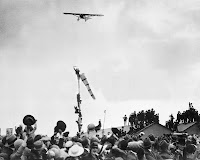 At 10:22pm on 21st May 1927, Charles Lindbergh landed at Le Bourget Aerodrome, Paris completing the first ever non-stop solo transatlantic flight. Lindbergh took off from Roosevelt Field, New York at 7:52am the day before in a Ryan NYP monoplane. The aircraft was called The Spirit of St. Louis in honour of the home city of the major investors in the flight. These businessmen raised around $16,000 in loans and donations to add to Lindbergh’s savings of $2,000 in the hope of claiming the $25,000 Orteig Prize. This prize – sponsored by the French born owner of the Lafayette Hotel in New York, Raymond Orteig – had already claimed the lives of six aviators in the attempt of making non-stop flights between New York and Paris.
At 10:22pm on 21st May 1927, Charles Lindbergh landed at Le Bourget Aerodrome, Paris completing the first ever non-stop solo transatlantic flight. Lindbergh took off from Roosevelt Field, New York at 7:52am the day before in a Ryan NYP monoplane. The aircraft was called The Spirit of St. Louis in honour of the home city of the major investors in the flight. These businessmen raised around $16,000 in loans and donations to add to Lindbergh’s savings of $2,000 in the hope of claiming the $25,000 Orteig Prize. This prize – sponsored by the French born owner of the Lafayette Hotel in New York, Raymond Orteig – had already claimed the lives of six aviators in the attempt of making non-stop flights between New York and Paris.
Following his flight Linbergh became a celebrity on both side of the Atlantic. The French President, Gaston Doumergue, bestowed the Légion d’honneur on him, and the Ministère des Affaires étrangères (French Foreign Office) flew the flag of the United States in his honour – the first time a foreign flag had been flown for anyone who was not a head of state. Back in the United States, Lindbergh received the Distinguished Flying Cross from President Calvin Coolidge on the same day that the U.S. Post Office Department issued a stamp depicting his plane in honour of his flight. The city of New York also honoured Lindbergh with a ticker tape parade and banquet.
Yet fame also brought tragedy for Lindbergh. In 1932, an intruder abducted his baby son Charles Jr. and demanded a ransom. The Lindbergh’s paid $50,000 in return for information about the location of their child; however, the information proved false and the baby’s body was found in woods near the Lindbergh’s home. Police traced one of the kidnappers, Bruno Richard Hauptmann, using the gold certificates that made up part of the ransom money. He was tried and found guilty of kidnapping and murder and sentenced to the death penalty, with the offer of commutation of the sentence to life imprisonment if he identified his accomplices; he chose not to and received his sentence of death by electrocution in 1936.


